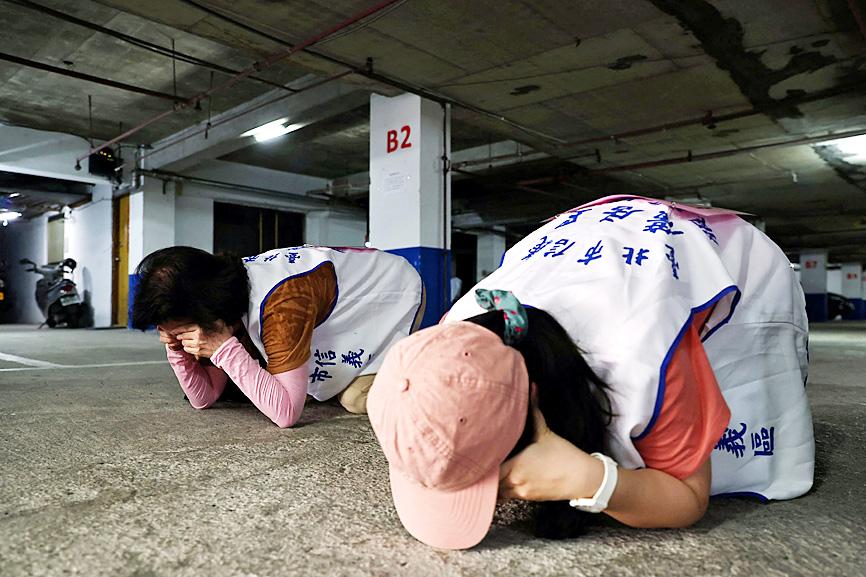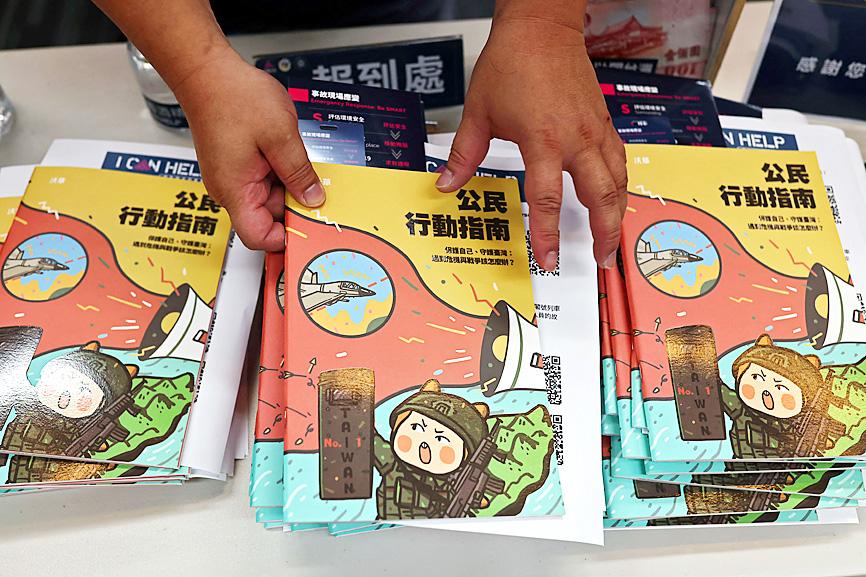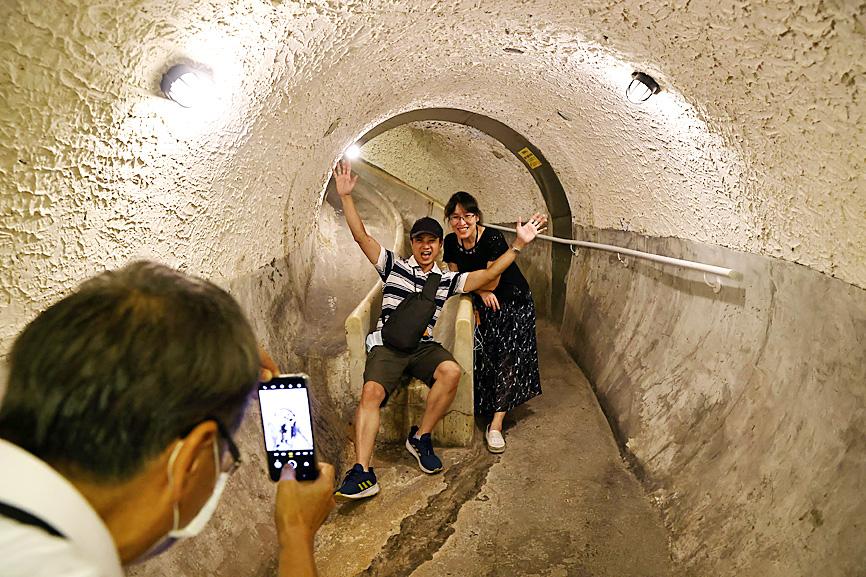Taiwan is preparing air-raid shelters as rising tension with China and Russia’s invasion of Ukraine raise new fears about the possibility of a Chinese attack.
China has in the past few years increased military activity in the air and seas around Taiwan, which vows to defend itself and has made strengthening its defenses a priority, with regular military and civil defense drills.
The preparations include designating shelters where people can take cover if Chinese missiles start flying in — not in purpose-built bunkers, but in underground spaces like basement car parks, the subway system and subterranean shopping centers.

Photo: Ann Wang, Reuters
Taipei has more than 4,600 such shelters that can accommodate about 12 million people, more than four times its population.
Harmony Wu, 18, was surprised to learn that an underground shopping concourse where she and other youngsters were recently rehearsing some dance moves would be turned into an air-raid shelter in the event of war.
However, she said she could understand why.

Photo: Ann Wang, Reuters
“Having shelter is very necessary. We don’t know when a war might come and they are to keep us safe,” Wu said. “War is brutal. We’ve never experienced it, so we aren’t prepared.”
Taipei officials have been updating their database of designated shelters, putting their whereabouts on a smartphone app, and launching a social media and poster campaign to make sure people know how to find their closest one.
Shelter entrances are marked with a yellow label, about the size of an A4 piece of paper, with the maximum number of people it can take.

Photo: Ann Wang, Reuters
A senior official in the city office in charge of the shelters said events in Europe had brought a renewed sense of urgency.
“Look at the war in Ukraine,” Taipei City Construction Management Office official Abercrombie Yang said.
“There’s no guarantee that the innocent public won’t get hit,” he said, adding that that was why the public had to be informed. “All citizens should have crisis awareness... We need the shelters in the event of an attack by the Chinese communists.”
Last month, Taiwan held a comprehensive nationwide Han Kuang military exercise for the first time since the COVID-19 pandemic disrupted regular drills.
Among the instructions citizens received in case of incoming missiles was to get down in their basement parking lots with their hands covering their eyes and ears while keeping their mouths open — to minimize the impact of blast waves.
Some civil defense advocates say more needs to be done.
Authorities are required by law to keep the shelters clean and open, but they do not have to be stocked with supplies like food and water.
Researchers in the Legislative Yuan in June called for shelters to be provided with emergency supplies.
Democratic Progressive Party Legislator Enoch Wu (吳怡農) said the public must prepare survival kits to take with them when they seek shelter.
“What’s important is what you bring with you, for people to stay there for a long period of time,” Wu said, citing medical supplies and even tools to build a makeshift toilet.
After decades of saber-rattling across the Taiwan Strait, many Taiwanese appear resigned to living with the threat of a Chinese invasion.
“I’m not stressed. I carry on with my life as usual. When it happens, it happens,” said Teresa Chang, 17, who was also going through her paces at the underground dance practice.

Taiwan is stepping up plans to create self-sufficient supply chains for combat drones and increase foreign orders from the US to counter China’s numerical superiority, a defense official said on Saturday. Commenting on condition of anonymity, the official said the nation’s armed forces are in agreement with US Admiral Samuel Paparo’s assessment that Taiwan’s military must be prepared to turn the nation’s waters into a “hellscape” for the Chinese People’s Liberation Army (PLA). Paparo, the commander of the US Indo-Pacific Command, reiterated the concept during a Congressional hearing in Washington on Wednesday. He first coined the term in a security conference last

Prosecutors today declined to say who was questioned regarding alleged forgery on petitions to recall Democratic Progressive Party (DPP) legislators, after Chinese-language media earlier reported that members of the Chinese Nationalist Party (KMT) Youth League were brought in for questioning. The Ministry of Justice Investigation Bureau confirmed that two people had been questioned, but did not disclose any further information about the ongoing investigation. KMT Youth League members Lee Hsiao-liang (李孝亮) and Liu Szu-yin (劉思吟) — who are leading the effort to recall DPP caucus chief executive Rosalia Wu (吳思瑤) and Legislator Wu Pei-yi (吳沛憶) — both posted on Facebook saying: “I

The Ministry of Economic Affairs has fined Taobao NT$1.2 million (US$36,912) for advertisements that exceed its approved business scope, requiring the Chinese e-commerce platform to make corrections in the first half of this year or its license may be revoked. Lawmakers have called for stricter enforcement of Chinese e-commerce platforms and measures to prevent China from laundering its goods through Taiwan in response to US President Donald Trump’s heavy tariffs on China. The Legislative Yuan’s Finance Committee met today to discuss policies to prevent China from dumping goods in Taiwan, inviting government agencies to report. Democratic Progressive Party Legislator Kuo Kuo-wen (郭國文) said

Sung Chien-liang (宋建樑), who led efforts to recall Democratic Progressive Party (DPP) Legislator Lee Kun-cheng (李坤城), was released on bail of NT$80,000 today amid outcry over his decision to wear a Nazi armband to questioning the night before. Sung arrived at the New Taipei District Prosecutors’ Office for questioning in a recall petition forgery case last night wearing a red armband bearing a swastika, carrying a copy of Adolf Hitler’s Mein Kampf and giving a Nazi salute. Sung left the building at 1:15am without the armband and covering the book with his coat. Lee said today that this is a serious